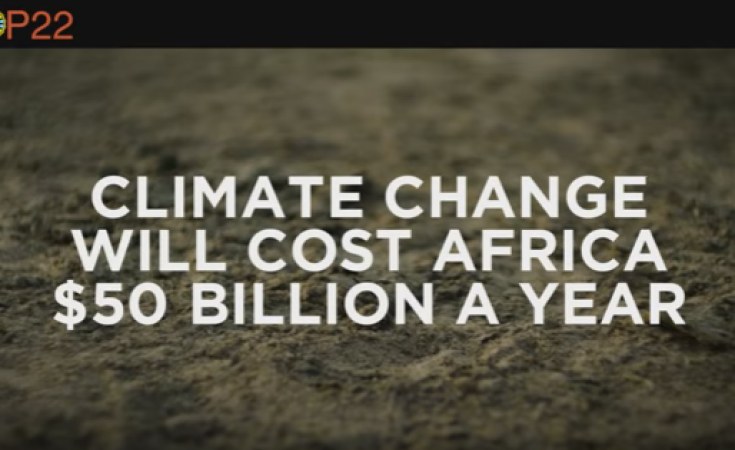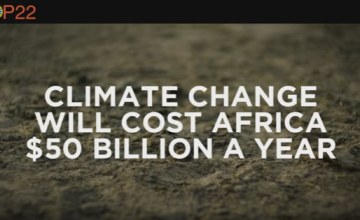- Urgent action needed to stop climate-induced displacement of public expenditures
- Global finance mechanisms to pay for insurance premiums
- AREI is fully operational; time for the G7 to fulfill Paris pledges
Global finance mechanisms such as the Green Climate Fund and the Global Environmental Facility must support Africa to adapt to climate change and stop the displacement of public spending caused by climate change, African Development Bank Group President, Akinwumi Adesina, told the United Nations climate conference, which ended on November 18.
"Words of comfort are not enough to pay Africa's rising bills for adapting to climate change," said Adesina, who was addressing the African Heads of State and dignitaries attending the Africa Action Summit hosted by the King of Morocco on the sidelines of the 22nd Conference of the Parties (COP22) to the UN Framework Convention on Climate Change (UNFCCC) in Marrakech.
The Africa Action Summit brought together 50 Heads of State and Government, UN Secretary-General Ban Ki-moon, as well as representatives of international organizations.
Addressing the Summit, Adesina specifically called on global finance mechanisms to pay for the premiums of African countries to the African Risk Capacity, the mechanism developed by African countries to help them cope with extreme weather events, through insurance for catastrophic events. He observed that "the insurance premiums are not cheap and this has continued to discourage African countries from insuring themselves against the rising catastrophic risks."
A balanced energy mix for industrialization
Adesina stressed the urgency of the situation to African Leaders. The decline in commodity prices is already taking a toll on several countries, constricting their fiscal space. Economic growth is projected to decline to 1.9 percent in 2016 from 3.6 percent in 2015. "Africa has a very limited scope to adjust to and cope with more exogenous shocks," he said.
The recent effects of climate change are further worsening the fiscal environment for African countries. Unless urgent action is taken, governments run the risk of diverting more of the resources needed to boost growth to deal with climate risks. Africa receives only 4% of all global finance funds. Only about 14% of global climate finance goes into adaptation.
Looking ahead, Adesina said that Africa must "power up" itself to "add value to what it produces, speed up industrialization and move to the top of global value chains." He observed that this must start with unlocking the huge amounts of energy potential on the continent. "Potential is important, yes, but potential alone cannot light up homes or power industries," he told the Opening Panel of Africa Day. "We must ensure that Africa develops a balanced energy mix that will allow it to industrialize. Grid, mini-grid and off-grid systems will play a major role," Adesina reiterated.
The event was attended by several African leaders, including Alpha Condé, President of Guinea and African Union Coordinator for Renewable Energy; Faure Gnassingbé, President of Togo; Ellen Johnson Sirleaf, President of Liberia; and Seretse Khama Ian Khama, President of Botswana.
The African Development Bank has committed itself to invest US $12 billion in support of accelerating electricity supply in Africa to fast-track universal access to electricity in the next 10 years. The Bank's investment is expected to leverage between US $45-50 billion from the private sector.
Fulfilling Paris pledges
Meanwhile, the Africa Renewable Energy Initiative, set up by the African Union, is moving forward. The Independent Delivery Unit - hosted within the Bank - is fully operational. French President François Hollande welcomed the work of the Bank and announced that France will provide €2 billion over the next five years. France has already paid €6 million to support the Independent Delivery Unit. Germany has also committed to providing €2 million. The European Union has also pledged its support for the initiative.
To maintain the momentum, Adesina also called for fulfillment of the full pledge of the G7 to provide US $10 billion to the initiative. "The sooner this is made available, the faster we will all make progress in achieving the goal of universal access to electricity and acceleration of the growth of renewables in Africa's energy mix," he said.
The Marrakech Conference ended with a call for "a shift towards a new era of implementation and action on climate and sustainable development." The Marrakech Proclamation adopted on November 17, 2016 stresses the need for the highest political commitment in the fight against climate change. "We call for strong solidarity with those countries most vulnerable to the impacts of climate change, and underscore the need to support efforts aimed to enhance their adaptive capacity, strengthen resilience and reduce vulnerability," the document reads.



